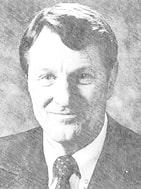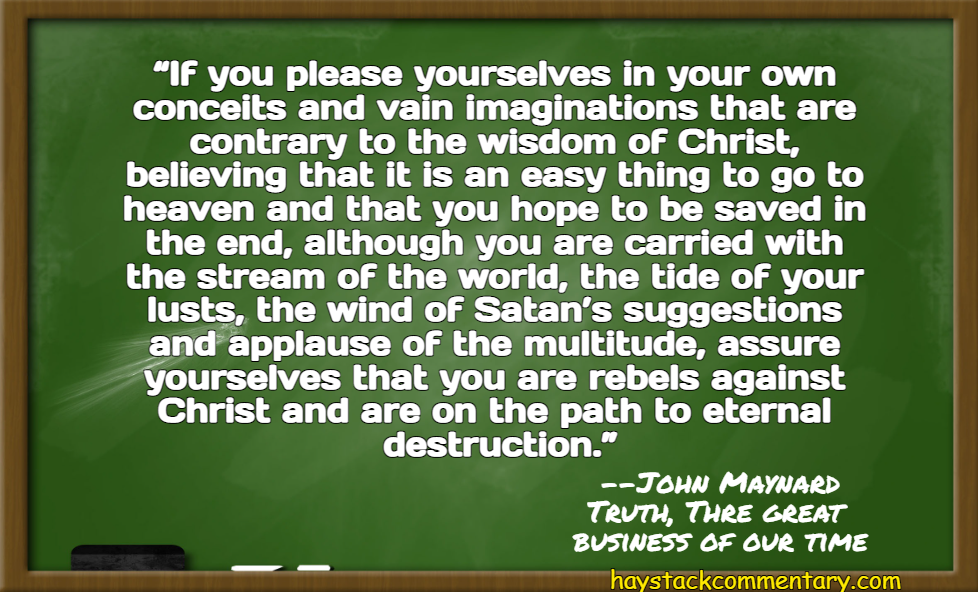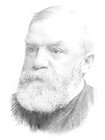- J. Gresham Machen - Walter R Martin - Justin Martyr - Willliam Mason - Neal Maxwell - John Maynard - Thomas McCall - J Vernon McGee - David McGough - Aimee Semple McPherson - James Russell Miller - Dwight L Moody - Leon Morris - Mother Teresa -
==J. Gresham Machen============
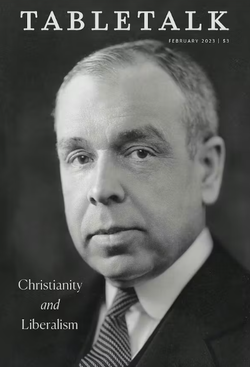 Table Talk Magazine February 2023
Table Talk Magazine February 2023
February 2023:
This year marks one hundred years since the publication of Christianity and Liberalism by J. Gresham Machen (1881–1937). Machen was a professor at Princeton Theological Seminary from 1906 to 1929, when he left to help establish Westminster Theological Seminary in Philadelphia, where he was professor of New Testament until his death. Machen was instrumental in the founding of what later became known as the Orthodox Presbyterian Church. He is one of the most important, but lesser-known, Christian figures of the twentieth century, and it would be difficult to overstate the significance of his classic work. In Christianity and Liberalism, Machen took a valiant and unwavering stance by drawing a sharp contrast between true, biblical Christianity (as summarized by the church’s historic creeds and confessions) and liberalism, demonstrating that liberalism is an altogether different religion from Christianity. While some chose not to enter the fray, Machen confidently and charitably fought to maintain the unity of the spirit in the bond of peace in the one, true church of Jesus Christ.
In his introduction, Machen wrote: “In the sphere of religion, as in other spheres, the things about which men are agreed are apt to be the things that are least worth holding; the really important things are the things about which men will fight. In the sphere of religion, in particular, the present time is a time of conflict; the great redemptive religion which has always been known as Christianity is battling against a totally diverse type of religious belief, which is only the more destructive of the Christian faith because it makes use of traditional Christian terminology.”
Machen argued that liberalism is a form of disguised naturalism based on modernistic scientific theories and not on the Word of God. Machen’s thesis has long been vindicated, as we have witnessed liberalism show itself time and again as an entirely false religion that preaches an entirely false gospel. Machen declared, “The Christian religion . . . is certainly not the religion of the modern liberal Church, but a message of divine grace, almost forgotten now, as it was in the middle ages, but destined to burst forth once more in God’s good time, in a new Reformation, and bring light and freedom to mankind.” This is precisely why we fight, as Machen did, standing firm and contending earnestly for the faith once delivered to the saints, for the sake of the gospel of Jesus Christ and the glory of our triune God. For without the gospel, there is no message of hope for mankind.
This year marks one hundred years since the publication of Christianity and Liberalism by J. Gresham Machen (1881–1937). Machen was a professor at Princeton Theological Seminary from 1906 to 1929, when he left to help establish Westminster Theological Seminary in Philadelphia, where he was professor of New Testament until his death. Machen was instrumental in the founding of what later became known as the Orthodox Presbyterian Church. He is one of the most important, but lesser-known, Christian figures of the twentieth century, and it would be difficult to overstate the significance of his classic work. In Christianity and Liberalism, Machen took a valiant and unwavering stance by drawing a sharp contrast between true, biblical Christianity (as summarized by the church’s historic creeds and confessions) and liberalism, demonstrating that liberalism is an altogether different religion from Christianity. While some chose not to enter the fray, Machen confidently and charitably fought to maintain the unity of the spirit in the bond of peace in the one, true church of Jesus Christ.
In his introduction, Machen wrote: “In the sphere of religion, as in other spheres, the things about which men are agreed are apt to be the things that are least worth holding; the really important things are the things about which men will fight. In the sphere of religion, in particular, the present time is a time of conflict; the great redemptive religion which has always been known as Christianity is battling against a totally diverse type of religious belief, which is only the more destructive of the Christian faith because it makes use of traditional Christian terminology.”
Machen argued that liberalism is a form of disguised naturalism based on modernistic scientific theories and not on the Word of God. Machen’s thesis has long been vindicated, as we have witnessed liberalism show itself time and again as an entirely false religion that preaches an entirely false gospel. Machen declared, “The Christian religion . . . is certainly not the religion of the modern liberal Church, but a message of divine grace, almost forgotten now, as it was in the middle ages, but destined to burst forth once more in God’s good time, in a new Reformation, and bring light and freedom to mankind.” This is precisely why we fight, as Machen did, standing firm and contending earnestly for the faith once delivered to the saints, for the sake of the gospel of Jesus Christ and the glory of our triune God. For without the gospel, there is no message of hope for mankind.
--horace mann--------------------
"Habit is a cable; we weave a thread of it every day, and at last we cannot break it." -Horace Mann
--Walter R Martin----------------
Walter Ralston Martin (September 10, 1928 – June 26, 1989) was born in Brooklyn, New York and was an American Baptist Christian minister and author who founded the Christian Research Institute in 1960 as a parachurch ministry specializing as a clearing-house of information in both general Christian apologetics and in countercult apologetics. As the author of the influential The Kingdom of the Cults (1965), he has been dubbed by the conservative Christian columnist Michael J. McManusthe "godfather of the anti-cult movement". Dr. Martin held four earned degrees including a Master of Arts in Philosophy from New York University, where he was a student alongside television evangelist D. James Kennedy. Kennedy confirmed the fact that Martin had completed all of the coursework for his doctorate, with the exception of his dissertation. He subsequently obtained a Ph.D. in 1976 from California Coast University, which was approved (not accredited) by the state of California at the time the degree was awarded.
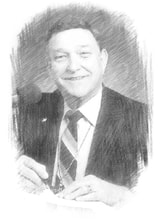 Walter R Martin
Walter R Martin
“Within the theological structure of the cults there is considerable truth, all of which, it might be added, is drawn from biblical sources, but so diluted with human error as to be more deadly than complete falsehood.”
― Walter Martin, The Kingdom of the Cults
“Truth by definition is exclusive. If truth were all-inclusive, nothing would be false.”
― Walter Martin, The Kingdom of the Cults
 Walter R Martin
Walter R Martin
“By the term cult I mean nothing derogatory to any group so classified. A cult, as I define it, is any religious group which differs significantly in one or more respects as to belief or practice from those religious groups which are regarded as the normative expressions of religion in our total culture.”
― Walter Martin, The Kingdom of the Cults
― Walter Martin, The Kingdom of the Cults
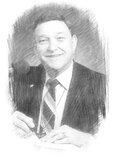 Walter R Martin
Walter R Martin
It should be carefully noted that Jesus did not say, "I am one of the equally good ways" or "I am a better way than the others, I am an aspect of truth; I am a fragment of the life." Instead, His claim was absolute, and allegiance to Him as the Savior of the world, was to take precedence over all the claims of men and religions. --Walter Martin
--justin martyr---------------------
Justin Martyr (c. AD 100 – c. AD 165), also known as Justin the Philosopher, was an early Christian apologist and philosopher. Most of his works are lost, but two apologies and a dialogue did survive. The First Apology, his most well-known text, passionately defends the morality of the Christian life, and provides various ethical and philosophical arguments to convince the Roman emperor, Antoninus, to abandon the persecution of the Church. Further, he also indicates, as St. Augustine would later, regarding the "true religion" that predated Christianity, that the "seeds of Christianity" (manifestations of the Logos acting in history) actually predated Christ's incarnation. This notion allows him to claim many historical Greek philosophers (including Socrates and Plato), in whose works he was well studied, as unknowing Christians.
Apr 5, 2022: Gospel Coalition: Don’t Overlook the Value of Cultural Apologetics
Throughout church history, you can find apologists trained to answer rational arguments raised against Christianity, men like Justin Martyr. You also find pastors who knew the Scriptures and the people they shepherded, men like Richard Baxter or Martyn Lloyd-Jones.
Throughout church history, you can find apologists trained to answer rational arguments raised against Christianity, men like Justin Martyr. You also find pastors who knew the Scriptures and the people they shepherded, men like Richard Baxter or Martyn Lloyd-Jones.
william mason
William Mason (1719 - 29 September 1791) was a Christian Calvinist writer from England. Mason was born in Rotherhithe, south London. He was a Justice of the Peace and later an acting Magistrate. He wrote a number of Christian books, and was twice briefly editor of The Gospel Magazine, immediately before and immediately after Augustus Montague Toplady. He also wrote several hymns, including “The Christian Surrender”.
Men ought always to pray and not to faint, Luke 18:1.
There can be no room for despair; for prayer exports wants and imports blessings: but our dear Lord knows there is in us all at times a backwardness to prayer; this he would remove: it arises from fainting, this he would prevent; therefore he opposes praying to fainting, for fainting prevents praying. Have you not found it so? When weary and faint in your mind, when your spirits are oppressed, your frame low and languid, you have thought this is not a time for prayer: yea, but it is: pray always. Now sigh out the burden of your heart and the sorrows of your spirit: now, though in broken accents, breathe your complaints into your Father’s ear: now cry to him who loveth you and careth for you with the love and care of the most tender and affectionate father. What makes us faint? Do troubles and afflictions? Here is a reviving cordial: “Call upon me in the day of trouble, I will deliver thee, and thou shalt glorify me.” Psalm 50:15. Does a body of sin and death? Here is a supporting promise: “Whosoever shall call upon the name of the Lord Jesus, shall be saved.” Rom.10:13. Do we faint because we have called and prayed again and again to the Lord against any besetting sin, prevailing temptation, rebellious lust, or evil temper, and yet the Lord has not given victory over it? Still, says the Lord, pray always: persevere; be importunate; faint not; remember that blessed word, “my time is not yet come: but your time is always ready.” John 8:6. “Watch and pray, that ye enter not into temptation” Matt. 26:41. Note the difference between being tempted and entering into temptation. We are assured in due time, we shall reap, if we faint not Gal. 6:9. Do we find the spirit willing, but the flesh weak? and because of our coldness, deadness, and langour in prayer, do we faint? You cannot pray to please yourself: you think your prayers are irksome to God; and therefore do you faint and are ready to give over praying? Look at David; he begins to pray in a very heartless, hopeless way. How long wilt thou forget me, O Lord, for ever, Sec. See how he concludes; he breaks out in full vigour of soul; “I will sing unto the Lord, because he hath dealt bountifully with me.” Psalm 13:6. Above all, look to Jesus, who ever lives to pray for you: look for his Spirit to help your infirmities. Rom. 8:26.
--From William Mason. A Spiritual Treasury for the Children of God. New York: Deare and Andrews, 1803.
There can be no room for despair; for prayer exports wants and imports blessings: but our dear Lord knows there is in us all at times a backwardness to prayer; this he would remove: it arises from fainting, this he would prevent; therefore he opposes praying to fainting, for fainting prevents praying. Have you not found it so? When weary and faint in your mind, when your spirits are oppressed, your frame low and languid, you have thought this is not a time for prayer: yea, but it is: pray always. Now sigh out the burden of your heart and the sorrows of your spirit: now, though in broken accents, breathe your complaints into your Father’s ear: now cry to him who loveth you and careth for you with the love and care of the most tender and affectionate father. What makes us faint? Do troubles and afflictions? Here is a reviving cordial: “Call upon me in the day of trouble, I will deliver thee, and thou shalt glorify me.” Psalm 50:15. Does a body of sin and death? Here is a supporting promise: “Whosoever shall call upon the name of the Lord Jesus, shall be saved.” Rom.10:13. Do we faint because we have called and prayed again and again to the Lord against any besetting sin, prevailing temptation, rebellious lust, or evil temper, and yet the Lord has not given victory over it? Still, says the Lord, pray always: persevere; be importunate; faint not; remember that blessed word, “my time is not yet come: but your time is always ready.” John 8:6. “Watch and pray, that ye enter not into temptation” Matt. 26:41. Note the difference between being tempted and entering into temptation. We are assured in due time, we shall reap, if we faint not Gal. 6:9. Do we find the spirit willing, but the flesh weak? and because of our coldness, deadness, and langour in prayer, do we faint? You cannot pray to please yourself: you think your prayers are irksome to God; and therefore do you faint and are ready to give over praying? Look at David; he begins to pray in a very heartless, hopeless way. How long wilt thou forget me, O Lord, for ever, Sec. See how he concludes; he breaks out in full vigour of soul; “I will sing unto the Lord, because he hath dealt bountifully with me.” Psalm 13:6. Above all, look to Jesus, who ever lives to pray for you: look for his Spirit to help your infirmities. Rom. 8:26.
--From William Mason. A Spiritual Treasury for the Children of God. New York: Deare and Andrews, 1803.
neal maxwell
Neal Ash Maxwell (July 6, 1926 – July 21, 2004) was an American scholar, educator, and religious leader who served as a member of the Quorum of the Twelve Apostles of the Church of Jesus Christ of Latter-day Saints (LDS Church) from 1981 until his death.
john maynard
John Maynard (1600–1665) divine, son of a wealthy yeoman, was baptised at Mayfield, Sussex, on 8 March 1600. The Maynards had been numerous in Mayfield and Rotherfield parishes for many generations. William Maynard, a member of the family, was burned with two of his servants at Lewes in the Marian persecution, 1557. John entered as a commoner at Queen’s College, Oxford, 21 June 1616, and graduated B.A. 3 Feb. 1620 as a ‘ grand compounder.’ He removed to Magdalen Hall, and proceeded M.A. 26 June 1622. He was allowed to use ‘communis et vulgaris habitus,’ instead of his purple gown, 6 July 1622. He owned at the time land in the manor of Sharendon, Mayfield parish (Sussex Arch. Coll. xxv. 55).
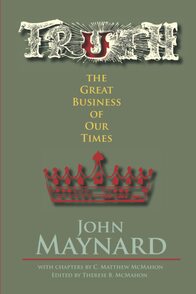
Proverbs 23:23, “Buy the Truth and sell it not.”
What is this Truth which we must buy? There exists a truth of things, the truth of their essence or being. So, all things that are, are truly the same as they are. Gold is true gold as opposed to that which is false and counterfeit. And this truth of things is the conformity of these things to the Divine intellect or knowledge of God. For the Lord in his infinite knowledge comprehends and asserts all truth. By default, every untruth uttered by men is either a denial of some truth which God affirms or an affirming of some falsehood which God denies. God is original Truth and the source of all truth. Further, the truth of things agrees with the original truth of God, just as the truth of a copy agrees with the original. Truth also carries a relationship to knowledge, as every Truth has the capacity to be understood, and the Truth of all things is their conformity to a right understanding.
It is the true knowledge of those things which serve for the perfecting of the inner and the ordering of the outward man. The true knowledge of God, of Christ, of the mysteries of grace, of the ways of God, of the power of godliness, and of the will of God in things concerning the matter and manner of his worship. Secondly, the practical truth of these things. That is, a frame of heart consistent with the nature of these things rightly understood cannot be without the possession of the things themselves. You must have God dwelling in you. You must possess Christ and be made one with him. Your body and soul must become a temple of the Holy Spirit. Otherwise, you will not have access to this practical, thorough, and effectual knowledge of God and Christ. Rather, you will possess a shadow of the truth rather than the truth itself. You must have the truth of all saving graces in you, otherwise you cannot have a heart suited to a right understanding of Divine Truth. Lastly, you must be so possessed of the truth that you speak the truth from the heart, and you walk in Truth.
[Taken from Truth, The Great Business of Our Times by John Maynard, Westminster Divine, soon to be published by Puritan Publications, 2022.]
What is this Truth which we must buy? There exists a truth of things, the truth of their essence or being. So, all things that are, are truly the same as they are. Gold is true gold as opposed to that which is false and counterfeit. And this truth of things is the conformity of these things to the Divine intellect or knowledge of God. For the Lord in his infinite knowledge comprehends and asserts all truth. By default, every untruth uttered by men is either a denial of some truth which God affirms or an affirming of some falsehood which God denies. God is original Truth and the source of all truth. Further, the truth of things agrees with the original truth of God, just as the truth of a copy agrees with the original. Truth also carries a relationship to knowledge, as every Truth has the capacity to be understood, and the Truth of all things is their conformity to a right understanding.
It is the true knowledge of those things which serve for the perfecting of the inner and the ordering of the outward man. The true knowledge of God, of Christ, of the mysteries of grace, of the ways of God, of the power of godliness, and of the will of God in things concerning the matter and manner of his worship. Secondly, the practical truth of these things. That is, a frame of heart consistent with the nature of these things rightly understood cannot be without the possession of the things themselves. You must have God dwelling in you. You must possess Christ and be made one with him. Your body and soul must become a temple of the Holy Spirit. Otherwise, you will not have access to this practical, thorough, and effectual knowledge of God and Christ. Rather, you will possess a shadow of the truth rather than the truth itself. You must have the truth of all saving graces in you, otherwise you cannot have a heart suited to a right understanding of Divine Truth. Lastly, you must be so possessed of the truth that you speak the truth from the heart, and you walk in Truth.
[Taken from Truth, The Great Business of Our Times by John Maynard, Westminster Divine, soon to be published by Puritan Publications, 2022.]
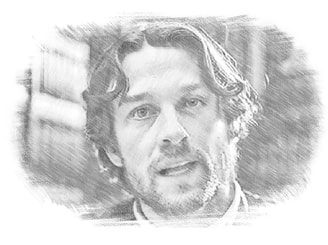 John Maynard
John Maynard
“If you please yourselves in your own conceits and vain imaginations that are contrary to the wisdom of Christ, believing that it is an easy thing to go to heaven and that you hope to be saved in the end, although you are carried with the stream of the world, the tide of your lusts, the wind of Satan’s suggestions and applause of the multitude, assure yourselves that you are rebels against Christ and are on the path to eternal destruction.” --Truth, the Great Business of Our Times, by John Maynard, (Crossville, TN: Puritan Publications, 2022)
If we are humble and sincere, God will finish in us the work He has begun. He never refuses His grace to those who ask it. --Catherine McAuley
thomas H mccall
Feb 20, 2023: Baptist News Global: Questions to ask while pondering if Asbury is hosting a ‘true revival’
Surprise! It’s a revival!
So said Thomas H. McCall, a theology professor at Asbury Theological Seminary, located adjacent to the ongoing spiritual event at Asbury University in Wilmore, Ky. “Sometimes God does what Johnathan Edwards called ‘surprising work’ and what John Wesley referred to as ‘extraordinary’ ministry,” he recalled.
Surprise! It’s a revival!
So said Thomas H. McCall, a theology professor at Asbury Theological Seminary, located adjacent to the ongoing spiritual event at Asbury University in Wilmore, Ky. “Sometimes God does what Johnathan Edwards called ‘surprising work’ and what John Wesley referred to as ‘extraordinary’ ministry,” he recalled.
"The idea of the need for a ‘spiritual resistance’ to National Socialism – which informed the views of Muth, Bergengruen and Haecker – was a very important philosophical influence on Sophie Scholl’s own moral, intellectual and spiritual journey towards active opposition.
[…]
What form such an opposition could take was – at this time – still hazy. But during the summer of 1941, an anonymous leaflet was delivered in a brown envelope to the Scholl apartment on Cathedral Square. It was produced on a duplicating machine.
It contained the full draft of a sermon given by the German Catholic bishop, Clement Graf von Galen, which had denounced Hitler’s state-organised euthanasia programme (codenamed T4) which the Nazi regime had secretly established in August 1939 – and which was systematically killing thousands of mentally ill and physically handicapped adults and children in a number of German mental hospitals. The T4 programme used lethal injections, gas vans and shower rooms converted into gas chambers.
The leaflet added personal comments supporting Galen’s sermon. It asked every recipient to make six copies and mail them to their friends. Hans Scholl seemed deeply impressed by this anonymous but clever act of opposition. ‘Finally’, Hans told Inge Scholl, ‘a man has had the courage to speak out’ and after reading it in detail he commented ‘We really ought to have a duplicating machine.’ The anonymous leaflet provided a useful blueprint for a non-violent opposition group to influence opinion and hope to avoid detection by the Gestapo.
In the sermon, Galen told his congregation that people were not animals, to be slaughtered when they ceased to be of productive us:
‘Once it [state-sponsored killing] is allowed … then fundamentally the way is open to the murder of all unproductive people, of the incurably ill, of people invalided out of work or out of the war, then the way is open to murder of all of us, when we become old and weak … who can trust his doctor anymore?’
The speech was not reported in the press, but it was mentioned on BBC Radio’s German service. Hitler decided that to arrest such a high-profile Catholic bishop might create a martyr. Joseph Goebbels thought that a better method to gain public support was subtle propaganda.
In August 1941, the Nazi Propaganda Ministry sponsored a feature film called ‘I Accuse’ in which a young and beautiful German woman with multiple sclerosis says she would like to die to prevent further suffering. There are long discussions in the film, seen by 18 million Germans, about the rights and wrongs of such an assisted suicide, but in the end she is helped to die by her husband and a family friend.
Eventually, the Nazis decided to halt the programme of killing mentally and physically handicapped adults, but the killing of children continued in much stricter secrecy and was eventually moved out of hospitals and into the extermination camps." —Frank McDonough, Sophie Scholl: The real story of the woman who defied Hitler, 79-80.
[…]
What form such an opposition could take was – at this time – still hazy. But during the summer of 1941, an anonymous leaflet was delivered in a brown envelope to the Scholl apartment on Cathedral Square. It was produced on a duplicating machine.
It contained the full draft of a sermon given by the German Catholic bishop, Clement Graf von Galen, which had denounced Hitler’s state-organised euthanasia programme (codenamed T4) which the Nazi regime had secretly established in August 1939 – and which was systematically killing thousands of mentally ill and physically handicapped adults and children in a number of German mental hospitals. The T4 programme used lethal injections, gas vans and shower rooms converted into gas chambers.
The leaflet added personal comments supporting Galen’s sermon. It asked every recipient to make six copies and mail them to their friends. Hans Scholl seemed deeply impressed by this anonymous but clever act of opposition. ‘Finally’, Hans told Inge Scholl, ‘a man has had the courage to speak out’ and after reading it in detail he commented ‘We really ought to have a duplicating machine.’ The anonymous leaflet provided a useful blueprint for a non-violent opposition group to influence opinion and hope to avoid detection by the Gestapo.
In the sermon, Galen told his congregation that people were not animals, to be slaughtered when they ceased to be of productive us:
‘Once it [state-sponsored killing] is allowed … then fundamentally the way is open to the murder of all unproductive people, of the incurably ill, of people invalided out of work or out of the war, then the way is open to murder of all of us, when we become old and weak … who can trust his doctor anymore?’
The speech was not reported in the press, but it was mentioned on BBC Radio’s German service. Hitler decided that to arrest such a high-profile Catholic bishop might create a martyr. Joseph Goebbels thought that a better method to gain public support was subtle propaganda.
In August 1941, the Nazi Propaganda Ministry sponsored a feature film called ‘I Accuse’ in which a young and beautiful German woman with multiple sclerosis says she would like to die to prevent further suffering. There are long discussions in the film, seen by 18 million Germans, about the rights and wrongs of such an assisted suicide, but in the end she is helped to die by her husband and a family friend.
Eventually, the Nazis decided to halt the programme of killing mentally and physically handicapped adults, but the killing of children continued in much stricter secrecy and was eventually moved out of hospitals and into the extermination camps." —Frank McDonough, Sophie Scholl: The real story of the woman who defied Hitler, 79-80.
"Sophie was increasingly finding comfort in reading the Bible at this point in her life. Many of her letters contain quotations from it. Sophie’s mother was a committed Christian and she greatly influenced and encouraged her children to seek solace in biblical study. It is noticeable how many letters from the Scholl family to friends contain religious presets, most notably new copies of the Bible and books on theological matters, and often very lengthy reflections about questions of morality and religious belief. In a very typical letter, Fritz acknowledges receipt of a copy of the New Testament from Sophie’s mother while on military duty in France, and he tells Sophie: ‘When I’ve got more time I’ll write to your mother and offer detailed thanks.’
In many other letters, Sophie emphasises that Christian values and the right to religious freedom are key elements in any moral regeneration of Germany. A key component of her revulsion towards Hitler was a firm belief that he wanted Nazism to be a secular ideology, which was antithetical to the humanistic teachings of the Bible.
[…]
For Sophie, the Nazi version of nationalism was ‘subjective and partisan’. It was attempting to usurp religion for its own cause. What Sophie wanted was a patriotism that was ‘objective, impartial and even handed’ and especially one that ‘tolerated spiritual and religious feelings’." —Frank McDonough, Sophie Scholl: The real story of the woman who defied Hitler, 68.
In many other letters, Sophie emphasises that Christian values and the right to religious freedom are key elements in any moral regeneration of Germany. A key component of her revulsion towards Hitler was a firm belief that he wanted Nazism to be a secular ideology, which was antithetical to the humanistic teachings of the Bible.
[…]
For Sophie, the Nazi version of nationalism was ‘subjective and partisan’. It was attempting to usurp religion for its own cause. What Sophie wanted was a patriotism that was ‘objective, impartial and even handed’ and especially one that ‘tolerated spiritual and religious feelings’." —Frank McDonough, Sophie Scholl: The real story of the woman who defied Hitler, 68.
"One of Sophie’s history teachers often used examples from history to provoke more open debate. In one discussion concerning the death of Mary, Queen of Scots, and the role of Elizabeth I in her execution, most of the pro-Nazi students in Sophie’s class argued that Elizabeth was justified in her actions as she had wanted brutally to crush all opposition. Sophie argued that the state had to operate within the terms of the law and protect the right of individuals to protest against what they felt was tyrannical rule.
Of course, this topic had an obvious parallel with what was going on in Nazi Germany, but only by using these past events obliquely could any meaningful moral questions ever be debated in an otherwise rigidly prescribed conformist curriculum in the German schools." —Frank McDonough, Sophie Scholl: The real story of the woman who defied Hitler, 54.
Of course, this topic had an obvious parallel with what was going on in Nazi Germany, but only by using these past events obliquely could any meaningful moral questions ever be debated in an otherwise rigidly prescribed conformist curriculum in the German schools." —Frank McDonough, Sophie Scholl: The real story of the woman who defied Hitler, 54.
"Hans Scholl increasingly looked for answers to the human predicament in philosophy, literature and the words of the Bible. He found the works of St Augustine inspiring and uplifting, especially his view that barbarians could not prevail against the truth of God. Another major source of inspiration was the writings of St Thomas Aquinas. Hans was particularly inspired by Aquinas’ view that the state existed to serve the individual, not the other way around.
Hans would frequently share his views with Sophie when he came home and they developed a great love of discussing philosophical and spiritual writings and trying to find answers to the big questions of conscience, belief, life and death." —Frank McDonough, Sophie Scholl: The real story of the woman who defied Hitler, 53.
Hans would frequently share his views with Sophie when he came home and they developed a great love of discussing philosophical and spiritual writings and trying to find answers to the big questions of conscience, belief, life and death." —Frank McDonough, Sophie Scholl: The real story of the woman who defied Hitler, 53.
"Sophie made very few friends during her time at the camp, largely out of choice. For most of the time she behaved in a rather idiosyncratic manner. The other girls did not hate her, but they thought she was aloof, bookish, and undemonstrative. Sophie, for her part, disliked the sexually crude banter of her female colleagues. She hated the frequent ‘snide comments’ they often made about her love of art, highbrow books, novels and poetry, but she thought they were ‘quite ordinary decent girls’ at heart.
Her one source of refuge from her frivolous, socially incompatible companions was reading the book by Thomas Mann she had smuggled in (Magic Mountain) and a much-thumbed selected volume of writings by St Augustine. In Confessions of St Augustine she found a quotation that she felt was in keeping with her own views. ‘Thou hast created us for Thyself, and our heart cannot be quieted till it find repose in Thee.’
The camp leader did not allow any of the other young women to have books at all, but in Sophie’s words: ‘she lets me have them (why I’ve no idea)’." —Frank McDonough, Sophie Scholl: The real story of the woman who defied Hitler, 75.
Her one source of refuge from her frivolous, socially incompatible companions was reading the book by Thomas Mann she had smuggled in (Magic Mountain) and a much-thumbed selected volume of writings by St Augustine. In Confessions of St Augustine she found a quotation that she felt was in keeping with her own views. ‘Thou hast created us for Thyself, and our heart cannot be quieted till it find repose in Thee.’
The camp leader did not allow any of the other young women to have books at all, but in Sophie’s words: ‘she lets me have them (why I’ve no idea)’." —Frank McDonough, Sophie Scholl: The real story of the woman who defied Hitler, 75.
"Although Sophie was brought up a Lutheran, she was drawn towards certain aspects of the Catholic faith. In some of her letters she described Protestant churches as cold, but viewed Catholic ones as much warmer places. ‘One must not lose heart’, Sophie wrote in her diary on 10 November 1941:
‘once when I lost heart because I kept backsliding, I didn’t dare pray anymore. I decided not to ask more of God until I could enter his presence again. That in itself is a fundamental yearning for God. But I can always ask him (through prayer), I know that now.’
‘She sensed God was very much relevant to her freedom’, Inge Scholl later recalled:
‘That freedom became more and more meaningful for her. In those years of total bondage, questioning about God opened her eyes to the surrounding world … God was your insight into yourself. He was the only mirror you could see and understand yourself with clarity.’ “ —Frank McDonough, Sophie Scholl: The real story of the woman who defied Hitler, 82.
‘once when I lost heart because I kept backsliding, I didn’t dare pray anymore. I decided not to ask more of God until I could enter his presence again. That in itself is a fundamental yearning for God. But I can always ask him (through prayer), I know that now.’
‘She sensed God was very much relevant to her freedom’, Inge Scholl later recalled:
‘That freedom became more and more meaningful for her. In those years of total bondage, questioning about God opened her eyes to the surrounding world … God was your insight into yourself. He was the only mirror you could see and understand yourself with clarity.’ “ —Frank McDonough, Sophie Scholl: The real story of the woman who defied Hitler, 82.
"My sole sustenance is Nature,’ she noted in her diary in December 1941, ‘the sky the stars and the silent earth’, adding, ‘I realise that when I love people very much I can’t do better than include them in my prayers. If I love people in all sincerity, I love them for God’s sake. What better thing can I do than take that love to God? God grant that I come to love Fritz too in his name. ‘
Inge Scholl believed Sophie’s love of nature was linked to her growing conviction ‘that behind all living things there must be a creative force at work’. Otl Aicher believed a strong sense of justice and morality were also key parts of Sophie’s personality and her striving for spirituality was an addition to this world view.“ --Frank McDonough, Sophie Scholl: The real story of the woman who defied Hitler, 84.
Inge Scholl believed Sophie’s love of nature was linked to her growing conviction ‘that behind all living things there must be a creative force at work’. Otl Aicher believed a strong sense of justice and morality were also key parts of Sophie’s personality and her striving for spirituality was an addition to this world view.“ --Frank McDonough, Sophie Scholl: The real story of the woman who defied Hitler, 84.
"I've decided to pray every day,’ she noted in her diary:
‘so that God won’t forsake me. Although I don’t yet know God and feel sure that my conception of him is utterly false, he’ll forgive me if I ask him. If I can love him with all my soul, I shall lose my distorted view of him … O Lord, I need so badly to pray, to ask.’" —Frank McDonough, Sophie Scholl: The real story of the woman who defied Hitler, 85.
‘so that God won’t forsake me. Although I don’t yet know God and feel sure that my conception of him is utterly false, he’ll forgive me if I ask him. If I can love him with all my soul, I shall lose my distorted view of him … O Lord, I need so badly to pray, to ask.’" —Frank McDonough, Sophie Scholl: The real story of the woman who defied Hitler, 85.
==j. vernon mcgee=============
==david mcgough===============
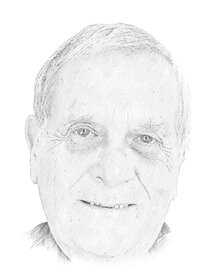 David McGough
David McGough
The Prophet Zechariah’s joyful call to hope, addressed originally to a broken and dispirited people, speaks powerfully to our own generation as we take the first uncertain steps to emerge from the devastation of the Covid 19 pandemic.
Through the words of Zechariah, the Lord had spoken to the uncertainty of a people who had experienced the destruction of Jerusalem, death, and the humiliation of forced exile. Now at last the exiles were able to reassemble in the ruins of all that had gone before. They faced a daunting task: the rebuilding of both a city and its people.
Zechariah’s clear message was that this rebuilding would be rooted in God’s saving power rather than the sinful pride that had led to the destruction of the first Jerusalem. They were called to a God who would indeed triumph, but who would come amongst them in humility rather than pride.
“He comes to you, humble and riding on a donkey.”
The pandemic has forced us into a period of reflection as we take our first, uncertain steps into the future. We face the same question that awaited Israel’s returning exiles. What kind of a society do we want to build, and what do we want as its guiding foundation? -Bishop David McGough; What the Prophet Zechariah can teach the post-Covid world 7.4.20
Through the words of Zechariah, the Lord had spoken to the uncertainty of a people who had experienced the destruction of Jerusalem, death, and the humiliation of forced exile. Now at last the exiles were able to reassemble in the ruins of all that had gone before. They faced a daunting task: the rebuilding of both a city and its people.
Zechariah’s clear message was that this rebuilding would be rooted in God’s saving power rather than the sinful pride that had led to the destruction of the first Jerusalem. They were called to a God who would indeed triumph, but who would come amongst them in humility rather than pride.
“He comes to you, humble and riding on a donkey.”
The pandemic has forced us into a period of reflection as we take our first, uncertain steps into the future. We face the same question that awaited Israel’s returning exiles. What kind of a society do we want to build, and what do we want as its guiding foundation? -Bishop David McGough; What the Prophet Zechariah can teach the post-Covid world 7.4.20
“The goodness of God has been manifested in continuing us in the possession of constitutions of government, which unite, and by their union establish, liberty and order." -John McKnight (1754-1823)
Better sleep with a sober cannibal than a drunken Christian. --Herman Melville
--James Russell Miller-------------
James Russell Miller (20 March 1840 – 2 July 1912) was a popular Christian author, Editorial Superintendent of the Presbyterian Board of Publication, and pastor of several churches in Pennsylvania and Illinois. In 1857, James entered Beaver Academy and in 1862 he progressed to Westminster College, Pennsylvania, from which he was graduated in June 1862. Then in the autumn of that year he entered the theological seminary of the United Presbyterian Church at Allegheny, Pennsylvania.
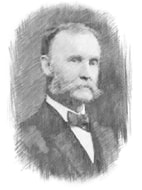 JR Miller Files
JR Miller Files
“God is our refuge and strength, an ever-present help in times of trouble.” Psalm 46:1
“I can do all things through Christ who strengthens me.” Philippians 4:13
Many a great battle is won by the reserves. The struggle is perfectly balanced, and victory is uncertain. Then, one side or the other brings up the reserve army, and instantly the question is settled. Life’s battles and crises are often determined in the same manner: by reserve resources — or their absence. Our days are not all bright, easy, and free of pain. The course is not always smooth. We all have tasks and duties which completely overwhelm our ability. We are all assailed by spiritual foes and temptations — and victory comes only if we can call our reserves into action. Blessed are those who have learned to draw on the infinite resources of divine strength. With the fullness of God as a reserve, they can never fail.
“Finally, be strong in the Lord and in His mighty power. Put on the full armor of God so that you can take your stand against the devil’s schemes.” Ephesians 6:10-11
“And my God will meet all your needs according to His glorious riches in Christ Jesus.” Philippians 4:19
-------J.R. Miller was a pastor and former editorial superintendent of the Presbyterian Board of Publication from 1880 to 1911. His works are now in the public domain.
“I can do all things through Christ who strengthens me.” Philippians 4:13
Many a great battle is won by the reserves. The struggle is perfectly balanced, and victory is uncertain. Then, one side or the other brings up the reserve army, and instantly the question is settled. Life’s battles and crises are often determined in the same manner: by reserve resources — or their absence. Our days are not all bright, easy, and free of pain. The course is not always smooth. We all have tasks and duties which completely overwhelm our ability. We are all assailed by spiritual foes and temptations — and victory comes only if we can call our reserves into action. Blessed are those who have learned to draw on the infinite resources of divine strength. With the fullness of God as a reserve, they can never fail.
“Finally, be strong in the Lord and in His mighty power. Put on the full armor of God so that you can take your stand against the devil’s schemes.” Ephesians 6:10-11
“And my God will meet all your needs according to His glorious riches in Christ Jesus.” Philippians 4:19
-------J.R. Miller was a pastor and former editorial superintendent of the Presbyterian Board of Publication from 1880 to 1911. His works are now in the public domain.
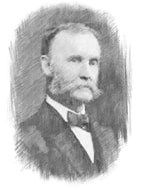 JR Miller Files
JR Miller Files
“His disciples came, and took up the body, and buried it, and went and told Jesus, Matthew 14:12.
WHEN one dies in our home, and our hearts are breaking, we should go and tell Jesus. It will do us good to tell Him. We may not care to tell our trouble to any human friend. Some sorrows are too sacred to be unveiled to any eyes. But we need never shrink from telling Jesus. He can understand our grief, for He knows all human pain, not alone as God, but as man, for He experienced all sorrow. He will treat our sorrow, too, with most delicate gentleness. The very words spoken in love to comfort us fall ofttimes with rude impact upon our bruised heart and give fresh pain. The gentlest touch of a human hand hurts where it is meant to help. But the voice of Jesus is so gentle that its tones fall like soothing music on the quivering heart, and the hand of Jesus is so skillful that its touch gives healing. We need never fear to tell Jesus of our sorrow: He is the truest Comforter and the wisest Healer of hurt hearts." --JR Miller
WHEN one dies in our home, and our hearts are breaking, we should go and tell Jesus. It will do us good to tell Him. We may not care to tell our trouble to any human friend. Some sorrows are too sacred to be unveiled to any eyes. But we need never shrink from telling Jesus. He can understand our grief, for He knows all human pain, not alone as God, but as man, for He experienced all sorrow. He will treat our sorrow, too, with most delicate gentleness. The very words spoken in love to comfort us fall ofttimes with rude impact upon our bruised heart and give fresh pain. The gentlest touch of a human hand hurts where it is meant to help. But the voice of Jesus is so gentle that its tones fall like soothing music on the quivering heart, and the hand of Jesus is so skillful that its touch gives healing. We need never fear to tell Jesus of our sorrow: He is the truest Comforter and the wisest Healer of hurt hearts." --JR Miller
--aimee semple mcPherson---------
Jan 24, 2016: KCET: How Los Angeles Helped Make the U.S. an Evangelical Nation
By the 1920s, Los Angeles hosted a particularly fervent strain of Christianity today referred to as evangelicalism, but it took decades to develop before reaching a true mass audience through the likes of Aimee Semple McPherson, Bob Shuler, and Los Angeles native Charles E. Fuller. The rise of Pentecostalism in the Azusa Street Revival during the first decade of the 20th century, the establishment of the Bible Institute of Los Angeles (Biola) near its second, and the ascension of the famed Aimee Semple McPherson and her Echo Park Angelus Temple in the century’s third decade, the 1920s, demonstrate this arc.
By the 1920s, Los Angeles hosted a particularly fervent strain of Christianity today referred to as evangelicalism, but it took decades to develop before reaching a true mass audience through the likes of Aimee Semple McPherson, Bob Shuler, and Los Angeles native Charles E. Fuller. The rise of Pentecostalism in the Azusa Street Revival during the first decade of the 20th century, the establishment of the Bible Institute of Los Angeles (Biola) near its second, and the ascension of the famed Aimee Semple McPherson and her Echo Park Angelus Temple in the century’s third decade, the 1920s, demonstrate this arc.
"The soul that has no established aim loses itself." --Michael de Montagigne (1533-1592)
"A theology of love cannot afford to be sentimental. It cannot afford to preach edifying generalities about charity, while identifying ‘peace’ with mere established power and legalized violence against the oppressed. A theology of love cannot be allowed merely to serve the interests of the rich and powerful, justifying their wars, their violence and their bombs, while exhorting the poor and underprivileged to practice patience, meekness, longsuffering, and to solve their problems, if at all, nonviolently. A theology of love may also conceivably turn out to be a theology of revolution. In any case, it is a theology of resistance, a refusal of the evil that reduces a brother or sister to homicidal desperation . . . Instead of preaching the Cross for others and advising them to suffer patiently the violence which we sweetly impose on them, with the aid of armies and police, we might conceivably recognize the right of the less fortunate to use force, and study more seriously the practice of nonviolence and humane methods on our own part when, as it happens, we possess the most stupendous arsenal of power the world has ever known."
- Thomas Merton ; Toward a Theology of Resistance
- Thomas Merton ; Toward a Theology of Resistance
--Dwight L Moody--------------------
Dwight Lyman Moody was born the sixth child of Edwin and Betsy Holton Moody in Northfield, Massachusetts on February 5, 1837. Dwight’s formal education ended after fifth grade, and he rapidly grew tired of life on the family farm. He left home at age 17 to seek employment in Boston. After failing to secure a desirable position, he asked his uncle, Samuel Holton, for a job. Reluctantly, Uncle Samuel hired Dwight to work in his own retail shoe store. However, to keep young Moody out of mischief, employment was conditional upon his attendance at the Mt. Vernon Congregational Church.
We can stand affliction better than we can prosperity, for in prosperity we forget God.
-Dwight L. Moody, American Clergyman (1837-1899)
-Dwight L. Moody, American Clergyman (1837-1899)
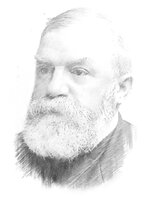 Dwight L Moody
Dwight L Moody
“I firmly believe that the moment our hearts are emptied of selfishness and ambition and self-seeking and everything that is contrary to God's law, the Holy Spirit will come and fill every corner of our hearts; but if we are full of pride and conceit, ambition and self-seeking, pleasure and the world, there is no room for the Spirit of God. I also believe that many a man is praying to God to fill him, when he is full already with something else. Before we pray that God would fill us, I believe we ought to pray that He would empty us. There must be a n emptying before there can be a filling; and when the heart is turned upside down, and everything that is contrary to God is turned out, then the Spirit will come...” ― D.L. Moody
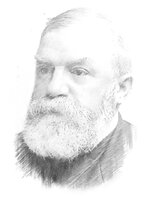 Dwight L Moody
Dwight L Moody
“What we need as Christians is to be able to feed ourselves. How many there are who sit helpless and listless, with open mouths, hungry for spiritual things, and the minister has to try to feed them, while the Bible is a feast prepared, into which they never venture.”
― Dwight Lyman Moody, Pleasure and Profit in Bible Study and Anecdotes, Incidents and Illustrations
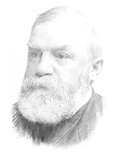 Dwight L Moody
Dwight L Moody
“When I pray, I talk to God, but when I read the Bible, God is talking to me; and it is really more important that God should speak to me than that I should speak to Him I believe we should know better how to pray if we knew our Bibles better. What is an army good for if they don’t know how to use their weapons?” ― D.L. Moody, Pleasure & Profit in Bible Study
Leon Morris
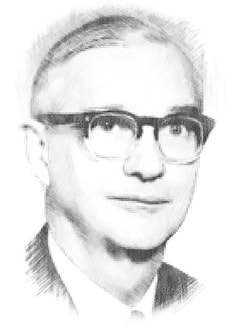 Leon Morris
Leon Morris
There is never the slightest hint in the New Testament that reconciliation can be brought about by what we do. We created the barrier that separates us from God (and from one another), but we cannot break it down. There are theologians who stress the element of human responsibility in such a way as to indicate that man brought about the alienation from God and that man can and should end it. On this view God’s attitude was always the same. He has always loved us and he is simply waiting for us to return to him. As soon as we do, reconciliation is effected.
But this is not what the New Testament is saying. The New Testament insists that something must be done about sin. It is not possible simply to ignore it, to count it as something that never happened. It did happen. Its results are with us. It has established a continuing enmity. For reconciliation to take place that enmity must be dealt with. And Paul emphasizes that this is what Christ did. Under this figure it is not said how the death of Christ put away sin, but it is said emphatically that is does. In redemption this is seen by way of paying the price, in justification by the bearing of penalty, and so on. There is no equivalent in reconciliation. But this way of looking at the atonement takes it that whatever had to be done was done. The important thing was the removal of the cause of the enmity and when Christ died on the cross he removed it.
This is something that he alone could do. Man is so immersed in sin that he does not even make the motion of wanting to leave it, let alone to do away with it. And even if he wanted to it is so big a task that it is more than he can accomplish. It is beyond him. But it is not beyond Christ. It is the measure of his greatness that he was able to accomplish this great task and he did. ‘He is our peace.’
--The Atonement: It’s Meaning and Significance by Leon Morris, page 148-149
But this is not what the New Testament is saying. The New Testament insists that something must be done about sin. It is not possible simply to ignore it, to count it as something that never happened. It did happen. Its results are with us. It has established a continuing enmity. For reconciliation to take place that enmity must be dealt with. And Paul emphasizes that this is what Christ did. Under this figure it is not said how the death of Christ put away sin, but it is said emphatically that is does. In redemption this is seen by way of paying the price, in justification by the bearing of penalty, and so on. There is no equivalent in reconciliation. But this way of looking at the atonement takes it that whatever had to be done was done. The important thing was the removal of the cause of the enmity and when Christ died on the cross he removed it.
This is something that he alone could do. Man is so immersed in sin that he does not even make the motion of wanting to leave it, let alone to do away with it. And even if he wanted to it is so big a task that it is more than he can accomplish. It is beyond him. But it is not beyond Christ. It is the measure of his greatness that he was able to accomplish this great task and he did. ‘He is our peace.’
--The Atonement: It’s Meaning and Significance by Leon Morris, page 148-149
--mother teresa------------------
Sept 27, 2021: SAMAA: New Delhi stops Mamata Banerjee from attending Rome conference
The peace conference – World Meeting for Peace ‘Peace as Brothers, Future earth’ – is being organized by Marco Impagliazzo, the president of the community of Sant’Egido (a Rome-based Catholic association), for the two-day event starting on October 6. Other prominent personalities attending the meeting are Pope Francis, Germany’s Chancellor Angela Merkel and Italian Prime Minister Mario Draghi. The event will be centred on Mother Teresa.
Aug 30, 2016: Aleteia: Exclusive interview: The priest who made the case for Mother Teresa’s sainthood
In a new book based on the writings of Mother Teresa of Calcutta, Father Brian Kolodiejchuk takes a page from Pope Francis and explains the deeper meaning of the word “mercy.”
The peace conference – World Meeting for Peace ‘Peace as Brothers, Future earth’ – is being organized by Marco Impagliazzo, the president of the community of Sant’Egido (a Rome-based Catholic association), for the two-day event starting on October 6. Other prominent personalities attending the meeting are Pope Francis, Germany’s Chancellor Angela Merkel and Italian Prime Minister Mario Draghi. The event will be centred on Mother Teresa.
Aug 30, 2016: Aleteia: Exclusive interview: The priest who made the case for Mother Teresa’s sainthood
In a new book based on the writings of Mother Teresa of Calcutta, Father Brian Kolodiejchuk takes a page from Pope Francis and explains the deeper meaning of the word “mercy.”





